*
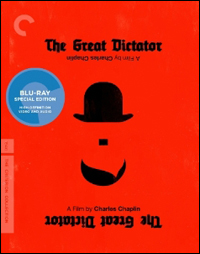 |
In 1939 Chaplin turned his attention to his first full-dialogue sound film, The Great Dictator [Criterion]; shooting started just one week after the German invasion of Poland, which is to say that Chaplin planned his production and wrote his script prior to the beginning of the War. (He clearly revised the script as he went along). The story tells of a Jewish barber — a clear facsimile of Chaplin's Tramp — who bears a strong physical resemblance to Adenoid Hynkel, dictator of Tomainia. Hynkel's henchmen are Garbitsch (Goebbels) and Herring (Goring); he has an unholy alliance with Benzino Napaloni (Mussolini), of the neighboring country Bacteria. And so on.
"The Great Dictator" was a major event when it was released in October 1940; not only was it controversial — he United States had not yet entered the war — but it marked the first time Chaplin talked on screen (other than his nonsense song in "Modern Times"). The film went on to become one of Chaplin's most successful movies. And no wonder; it is pretty wonderful. Smart, provocative, and seriously funny.
It seems trivial to talk of highlights, but Chaplin gives us many. The famous ballet of world domination, Hynkel dancing with an oversized globe-balloon to the Prelude from Wagner's "Lohengrin." The raucous meeting of Hynkel and Napaloni (Jack Oakie), with the two dictators — or is it the two star comedians? — jealously one-upping each other in every shot. The bravura barber shop scene, with Charlie-the-barber shaving an extra to Brahm's Hungarian Dance No. 5. (Chaplin's music man was Meredith Willson, of all people, who received an Oscar nomination for his efforts.) Most chilling are the two radio broadcasts delivered by Charlie. The first has Der Phooey shouting, screaming and bullying; you can almost see steam blowing out of Chaplin's ears. (So violent is his rage that at one point the radio microphone bends away from him in fear.) The second speech, which ends the film, has the barber — mistaken for Hynkel — make a plea for world peace. This begins with the barber masquerading as Hynkel, but it soon becomes clear that it is Chaplin as himself: "Do not despair. The misery that is now upon us is but the passing of greed, the bitterness of men who fear the way of human progress. The hate of men will pass and dictators will die, and the power they took from the people will return to the people. And so long as men die, liberty will never perish." As good and provocative and astounding as the film is, this last sequence makes an astonishing ending. Today, and most especially in a United States which was still neutral and chose to remain on the sidelines for more than two years after Hitler started his march.
The 2003 DVD release was carefully restored and in fine condition. Criterion's Blu-ray edition is even better, with a new high-definition digital restoration; eight years is a long time, technology wise. Special features — some of which appeared on the 2003 DVD — include new audio commentary by Chaplin historians Dan Kamin and Hooman Mehran; "The Tramp and the Dictator," Kevin Brownlow and Michael Kloft's 2001 documentary looking at the lives of Chaplin and Hitler; a piece on Chaplin's never-to-be-realized Napoleon project, which figured into his planning for "The Great Dictator"; and two silent barbershop sequences, from 1919 and 1921. Plus there is 27 minutes worth of (silent) color footage, shot on the set by Charlie's older brother Sydney. This is totally fascinating; Charlie Chaplin in full color! Who knew that his storm troopers wore scarlet trousers?
*
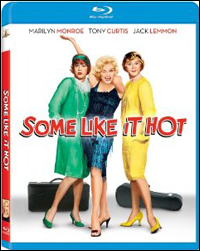 |
One wonders what the reaction would be of a modern-day viewer watching "Some Like It Hot" for the first time. Would he or she find it so irresistibly funny? It does seem an altogether perfect film to me, and perhaps to you. And it stands as a warning to those intent on taking cinema classics and turning them into Broadway musicals. "Some Like It Hot" was adapted into Sugar, in 1972, without the participation of Wilder and Diamond. And with an enormous amount of trouble, all down the line. Take it from me: it was lousy, with only Bobby Morse living up to memories of the film.
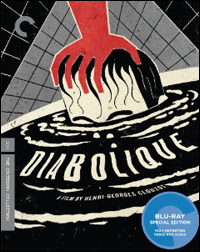 |
The folks at Criterion have done their usual fine job, taking a film that underwent an early Criterion restoration (in 1999) and further enhancing it for Blu-ray. Bonuses include selected-scene commentary, a video introduction by Serge Bromberg (codirector of Clouzot's "Inferno"), and a new interview with film critic Kim Newman.
The booklet includes an informative essay about the film, and the director, by Terrence Rafferty. Who points out that Hitchcock, in fact, admired "Diabolique" going so far as to screen Clouzot's film for his colleagues while they were writing "Vertigo" and "Psycho." Rafferty also tells us that the actor playing Monsieur Raymond, one of the teachers, is Michel Serrault, who later created the role of Albin/Zaza in the both the 1973 play and the 1978 film versions of "La Cage aux Folles."
*
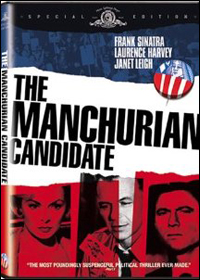 |
Sinatra and Harvey are excellent, as are several others (including Janet Leigh and James Gregory). The film is altogether stolen, though, by Angela Lansbury. Here she is — two years before Anyone Can Whistle, four years before Mame — and she is more deadly than our dear friend Mrs. Lovett. If you consider yourself a true Lansbury fan, you must see "The Manchurian Candidate." Now.
*
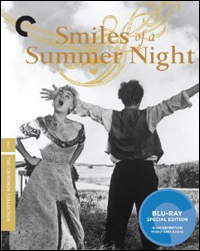 |
"Smiles," which has just been released in a Criterion Blu-ray, turns out to be warm, funny, and erotic. And rather different in feeling than Little Night Music; the Sondheim/Wheeler/Prince musical has a waltzing sensibility, which doesn't seem all too Swedish. This is neither here nor there, of course; Night Music works exceptionally well as musical theatre, while "Smiles" is quite fine as is.
Those of us who have seen Night Music two or three or seven times will notice any number of plot differences. Desiree does not have a twelve-year-old daughter, Fredrika; she has a son who looks to be under five, named Fredrik. (The elder Fredrik learns this almost immediately, not at the end.) Fredrik does not slip and trip into a hip bath; there is no hip bath, in fact. While Fredrik is found wearing Carl-Magnus' nightshirt, he and Desiree are thoroughly innocent of any misbehavior; thus there are no papers, those legal papers, she has to sign. (Desiree, that is.) Carl-Magnus and Charlotte do not crash Madame Armfeldt's weekend in the country; they are specifically and purposefully invited by Desiree. What's more, Desiree and Charlotte put their heads together to plot the events of the weekend. Henrik doesn't even have a cello; he plays piano and guitar. And that game of Russian roulette ends in a decidedly different manner.
Of course, none of this matters; but watching "Smiles" after all these years of Night Music is certainly invigorating and interesting. Food for thought, and for discussion. Bonus features — a video introduction to the film by Bergman, a conversation between Peter Cowie and Jorn Donner (of "Fanny and Alexander"), and the original trailer — seem recycled from the 2004 DVD release. Which makes sense, as Criterion created these excellent supplements not so long ago.
*
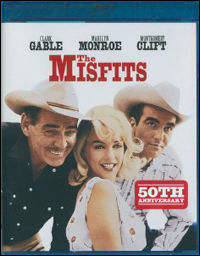 |
Highly watchable, but not very good. The film is interesting for its performances and its excesses; how could it not be? Gable, famously, shot his own stunts — including that scene where he ropes a horse and is dragged through the dirt; the 59-year-old star suffered a fatal heart attack two days after the end of shooting. Monroe, meanwhile, was in desperately poor shape as her life and her marriage to Miller disintegrated; this caused numerous delays during the filming. She lived on until 1962, but "The Misfits" turned out to be her final completed film.
Clift, too, came to the shoot with his own series of misfortunes. As did Huston. Co-starred were the invaluable Thelma Ritter and Eli Wallach. But all these separate pieces are misfits, just like the mismatched jigsaw puzzle pieces in the titles. The new Blu-ray release comes without any extras other than the original trailer. *
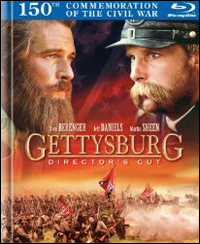 |
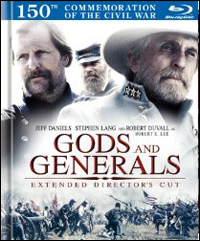 |
(Steven Suskin is author of the recently released Updated and Expanded Fourth Edition of "Show Tunes" as well as "The Sound of Broadway Music: A Book of Orchestrators and Orchestrations," "Second Act Trouble" and the "Opening Night on Broadway" books. He also pens Playbill.com's Book Shelf and On the Record columns. He can be reached at [email protected].)
*
Visit PlaybillStore.com to check out theatre-related DVDs for sale.










